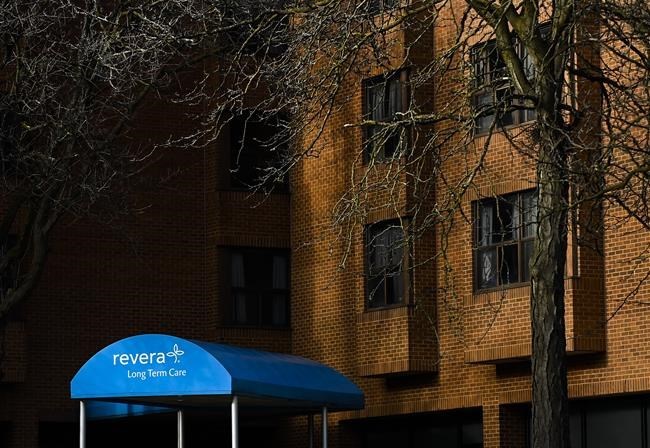TORONTO — A public sector union is reiterating a call for its pension investment manager to divest its ownership in Revera Inc. over the company's safety record during the COVID-19 pandemic, saying the fund should "pull out of the business of long-term care" altogether.
The Public Service Alliance of Canada, which represents 140,000 public sector pension plan members, first said in May that for-profit long-term care homes run by Revera should no longer be wholly owned by Public Sector Pension Investment, the Crown corporation managing public servants' pensions. Instead, the union says the homes should be managed by the public sector in order to protect both residents and pension funds.
After outbreaks at several of its facilities earlier this year, Revera on Monday released a report on how it had handled the first wave of COVID-19. The findings included shortcomings from public health officials, doctors, hospitals and workforce shortages as some of the reasons the novel coronavirus spread in its homes.
Calling the report a "slick corporate public relations exercise," PSAC National President Chris Aylward says his members remain concerned by their pension plan's ownership of Revera and "reiterate their call for the federal government to facilitate the transition of Revera to public hands as a first step toward a national, fully publicly funded long term care system."
Revera has 74 long-term care homes with about 9,400 residents across four provinces. Between March and September, COVID-19 infected 874 Revera residents and killed 266, and the company has reported several additional outbreaks this fall. Since September, more than 40 Revera homes have reported outbreaks, according to its website.
The company is privately held and does not disclose any financial information.
Revera's focus is "squarely on caring for our residents and containing the spread of the virus," said Revera vice-president of corporate affairs Susan Schutta.
"Since March, our emergency recruitment program has hired almost 4,000 new staff to support our residents," said Schutta, in an email. "We have introduced additional infection control support at all of our homes, have invested tens of millions in additionally staffing and non-staffing support, and have rolled out a privately-funded surveillance testing program for our staff and residents in markets where public health units do not provide this service."
Union attendees at a town hall earlier this year questioned Revera's handling of the pandemic. Christine Collins said at the online event that her brother was infected with COVID-19 at Revera-owned Carlingview Manor, but she received "little to no communication" from staff.
"Maybe you can imagine how very angry and horrified I am to find out that my pension plan, that I paid into for 37 years, owns Carlingview Manor as part of the Revera chain," Collins said during the town hall.
Aylward says shifting the business model is the union's preferred way for PSP — which administers pensions for public servants, Crown corporation employees, Canadian Forces members, the RCMP and Reserve Forces — to divest from Revera, rather than see it sold to another for-profit company, a move he says “would do absolutely nothing to improve the care of seniors in Revera facilities.”
Ed Cashman, an Ottawa-based retired public servant and PSP pension recipient, wonders if the second wave of COVID-19 would have played out differently if PSP had listened to the union's concerns about Revera earlier.
“When I find out that these homes are being operated in such poor conditions ... that raises a whole ethical question," said Cashman in an interview. “How can they allow Revera to be pulling out profits from long-term care?"
In May, Aylward wrote a letter to the chief executive of PSP stating that continuing business as usual "would not only be detrimental to the residents and employees of Revera Inc. but could also pose long-term consequences for the contributors and beneficiaries" of the pension plan.
Cashman also raised concerns about Revera during PSP's annual general meeting earlier this year, asking chief executive Neil Cunningham if PSP should consider divesting in Revera "before things get worse."
Revera faces two proposed class actions over its handling of the COVID-19 virus, with claims totalling $125 million. Cunningham said at the meeting that PSP doesn't believe the suits have merit, and that they were not reason enough to consider divesting from the long-term care business.
Cunningham said at the meeting that PSP would exit the investment in the future if it wasn't "proud" of the care provided in long-term care homes, but said that PSP's governance of Revera was robust.
Although PSP has a presence on Revera's board, the long-term care company said it is independently operated and does not ask PSP for funding or input on management.
The PSB investment board said it remains committed to Revera's board and leadership team. A statement provided by PSP said that it is watching Revera's management of the pandemic closely, but that the pension fund's confidence in staff has not been shaken.
Cashman questioned why the minister that oversees PSP — Treasury Board President Jean-Yves Duclos — can’t do more.
The Treasury Board of Canada Secretariat said in a statement that PSP's investment board operates at arm’s length from the federal government.
PSP said it is committed to working with all levels of government to "find the right solution for the long-term care industry and discuss lessons learned from the pandemic."
But, Aylward says, "it doesn't look very good when a federal Crown corporation that manages the pension plan for federal public sector workers owns a lot of these long-term care homes across the country."
This report by The Canadian Press was first published Dec. 9, 2020.
Anita Balakrishnan, The Canadian Press

